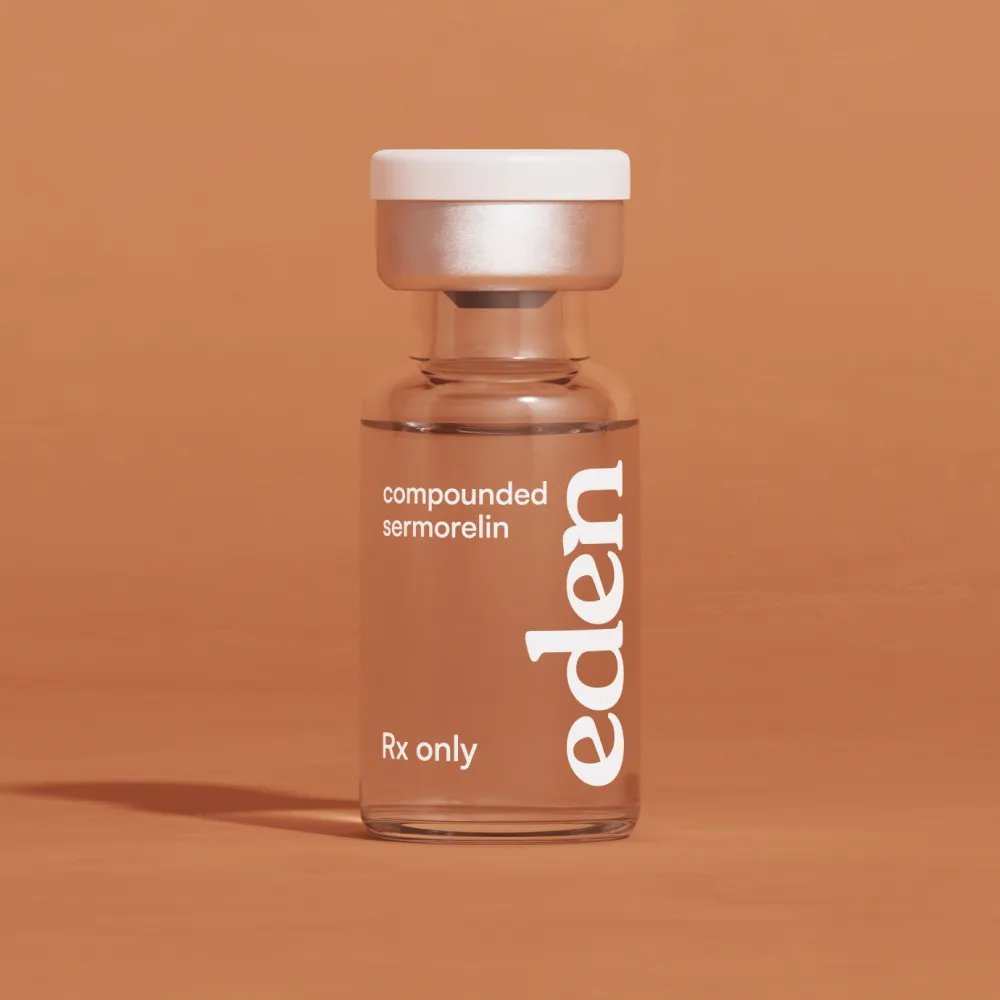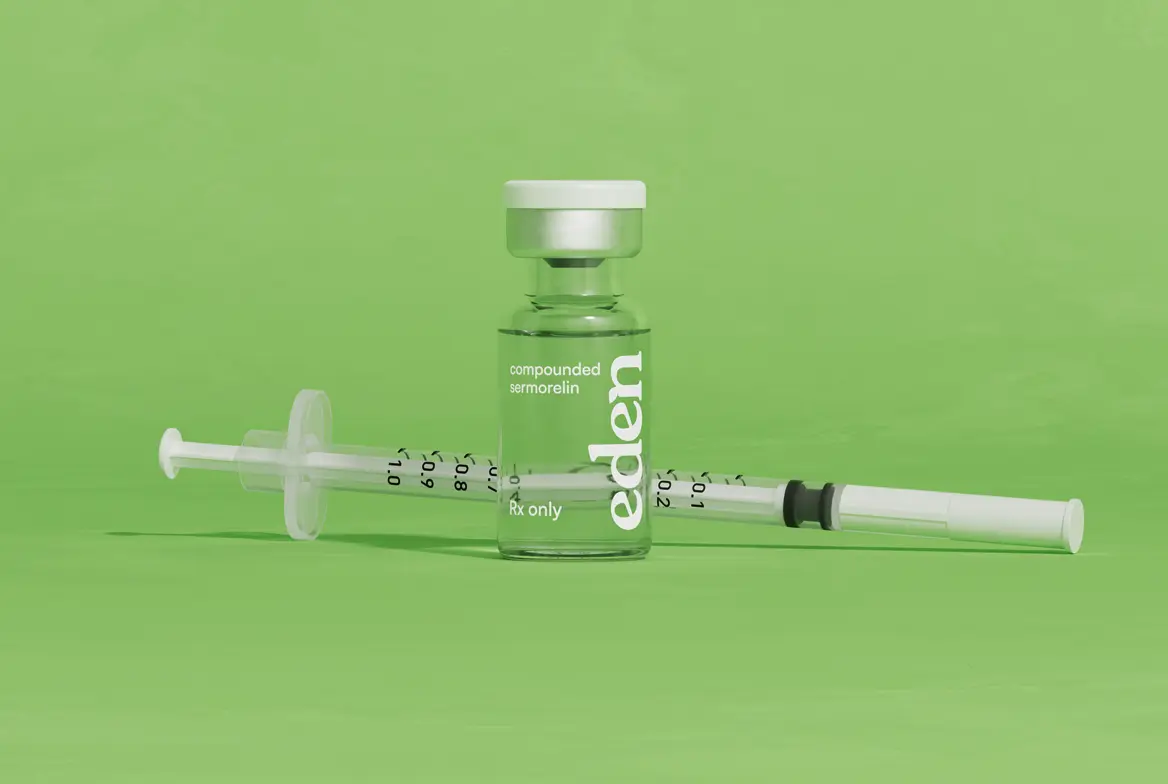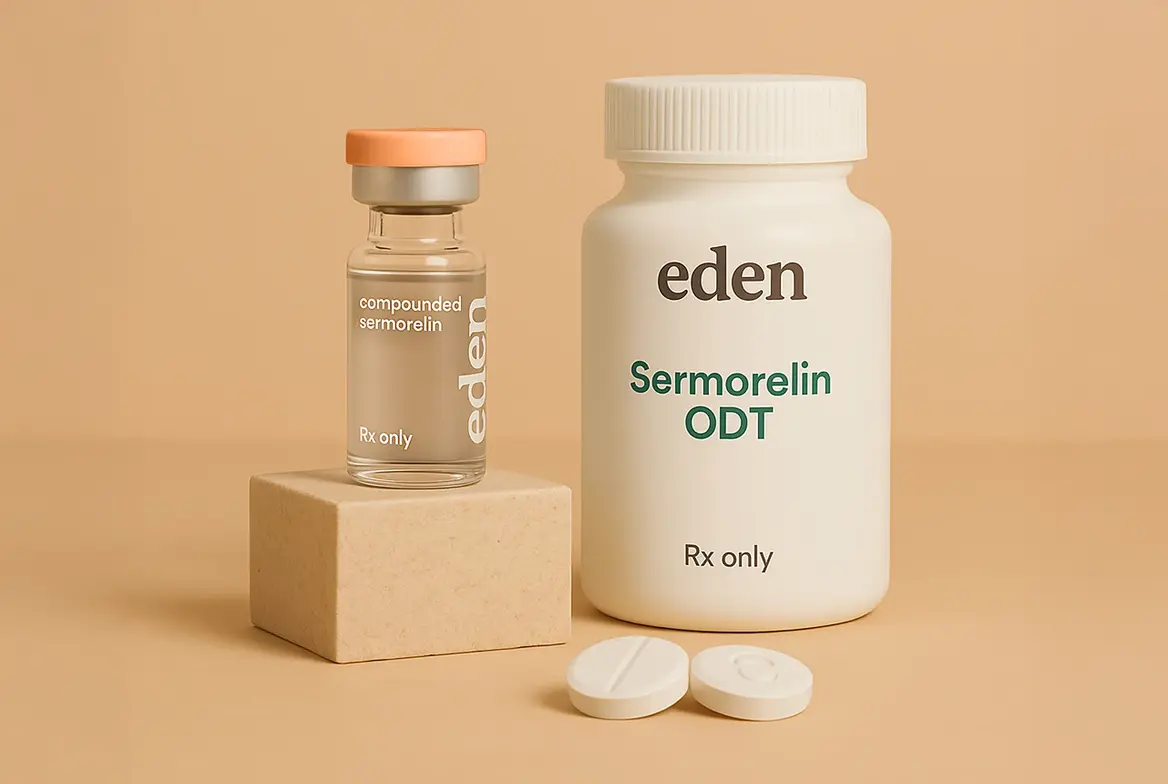Sermorelin Price Guide: Monthly Cost, Value, and How it Compares to Other Treatments


Curious about sermorelin price and monthly cost? This sermorelin price guide breaks down average costs ($150-$500/month), factors that affect pricing, how it compares to HGH and semaglutide, and ways to make sermorelin therapy more affordable.
Understanding sermorelin pricing can help you make an informed decision about this growth hormone therapy, which may offer significant benefits at a fraction of the cost of traditional human growth hormone (HGH).
- Sermorelin costs $150–$500/month, making it significantly cheaper than synthetic HGH therapy ($1000–$3000/month), though exact savings vary by dose, product, and program.
- Telehealth providers offer the best value at $150–$225 monthly.
- Results for many people appear gradually over 3–6 months, including improved sleep, energy, muscle mass, and recovery, but individual results vary and aren’t guaranteed.
- Sermorelin stimulates natural hormone production by working with your body’s existing hormone pathways, preserving your body’s feedback mechanisms, unlike direct HGH, though side effects and risks are still possible.
- Choose reputable providers with transparent pricing to maximize affordability and avoid hidden fees.
- Sermorelin is typically a compounded medication, which is not FDA-approved and isn’t reviewed by the FDA for safety, effectiveness, or quality.
Note: This blog is for general educational purposes only and is not a substitute for professional medical advice, diagnosis, or treatment. Always talk with a licensed healthcare professional before starting or changing any medication or hormone therapy.

Sermorelin typically costs around $150–$500 per month. This makes it a potential option for people who are considering growth hormone-related therapy with their provider.
The total cost of sermorelin peptide treatment depends on several key factors. The monthly expenses include medication ($150–$350), injection supplies ($20–$50), and provider supervision ($50–$100). Each dose of sermorelin injection typically costs $10–$20, based on your prescribed amount. These numbers might not seem important, but the cost of sermorelin therapy is much lower than synthetic HGH treatments that can cost $1000–$3000 monthly.
This piece breaks down the pricing details for sermorelin to help you decide whether this health investment aligns with your goals.
{{primary-cta}}
Understanding Sermorelin and Its Benefits
Let’s understand what sermorelin is and why it might be worth your investment before we talk about its cost. Sermorelin acetate is a synthetic peptide with 29 amino acids that mimics how growth hormone-releasing hormone (GHRH) works in your body. Your body’s natural processes work with sermorelin, unlike synthetic growth hormone treatments that directly add hormones to your system.
What is sermorelin used for?
The FDA approved sermorelin in 1997 for the diagnosis and treatment of children with growth hormone deficiency or growth failure. The medication stimulates the pituitary gland to release more natural growth hormone, which boosts plasma GH levels to support proper development.
Sermorelin is now generally accessed through compounding pharmacies, even though the original manufacturer stopped production in the late 2000s. There are currently no FDA-approved sermorelin products. Availability in the U.S. is typically through compounded medications, which are not reviewed or approved by the FDA for safety, effectiveness, or quality.
Many healthcare providers now prescribe it off-label to adults who experience age-related growth hormone decline. Research suggests that growth hormone secretion often starts to decline beginning in adulthood and continues to decrease with age.
People look for sermorelin therapy when they experience:
- Persistent fatigue or reduced stamina
- Loss of lean muscle mass
- Increased abdominal fat
- Poor sleep quality
- Delayed recovery after exercise
- Cognitive issues like brain fog
These symptoms are nonspecific and can have many causes, so they do not automatically mean you have a growth hormone deficiency. A licensed healthcare professional should evaluate you before considering treatment.
How it supports natural growth hormone production
Sermorelin works differently from direct HGH supplementation. It binds to specific receptors in the anterior pituitary gland and triggers your body to produce and release its own growth hormone. This creates a pulsatile release pattern that matches your body's natural GH secretion rhythms during deep sleep and in response to metabolic needs.
This natural approach offers clear advantages. Sermorelin encourages your pituitary gland to boost HGH gene transcription instead of flooding your system with external hormones. This helps maintain the growth hormone neuroendocrine system axis, which often deteriorates first with age.
Why it’s considered a safer alternative
Some physicians consider sermorelin a more physiologic alternative to synthetic HGH in select patients because of how it interacts with the body's natural hormone regulation.
Your body maintains its natural feedback mechanisms since sermorelin stimulates natural hormone production rather than directly supplying external hormones. The inhibitory neurohormone somatostatin regulates sermorelin’s effects. This feedback system may help reduce the likelihood of excessively high growth hormone levels compared with direct HGH injections, although inappropriate use can still carry risks.
Research in journals like The Journal of Clinical Endocrinology and Metabolism suggests that growth hormone is normally released in pulses under tight feedback control. Maintaining more physiologic patterns may help reduce the likelihood of excessively high GH levels, although this has not been definitively proven to prevent specific side effects.
Sermorelin therapy often costs significantly less than traditional HGH treatments. This makes it a sound choice both physiologically and economically for patients looking for growth hormone support when it’s prescribed and monitored by a quality healthcare professional.
Like any medication, sermorelin can cause side effects, such as injection site reactions, headache, nausea, flushing, or fatigue, and long-term safety data for anti-aging use in adults are limited. It's important to review potential risks and benefits with your provider.
Breaking Down the Real Cost of Sermorelin
The cost of peptide therapies plays a vital role in making informed treatment decisions. Let's get into what sermorelin therapy really costs and why prices can vary so much.
How much is sermorelin per month?
Most patients pay $150–$500 monthly for sermorelin. You can generally find better deals through telehealth companies. The price might go up to $500 based on where you live, how much you need, and who provides it.
This makes more sense when compared to synthetic human growth hormone treatments. HGH costs $1,000–$3,000 each month. The price gap is a big deal as it means that sermorelin offers a budget-friendly option for people looking for growth hormone support.
Many clinics say you should stick with the treatment for at least a few months to see the best results.
What affects the sermorelin injection cost
Your final sermorelin treatment cost depends on several key factors:
- Dosage requirements: Higher doses cost more. Your age, weight, and health needs determine how much you'll need.
- Administration method: Regular subcutaneous injections are standard, but nasal sprays cost 20 to 30% more because they're harder to make.
- Additional supplies: You'll need syringes, needles, and alcohol swabs. These add $20 to $50 to your monthly bill.
- Laboratory testing: Some programs include hormone level checks that can add $50 to $150 to your cost.
The usual plan includes five shots weekly, taken at night before bed. Your prescribing clinician should always determine your specific dose and schedule.
Cost differences by provider and plan
Your choice of provider and subscription plan can really change what you pay. Regular medical clinics charge $300 to $500+ per month, but telehealth providers often cost $150 to $225 for the same treatment.
Insurance rarely covers sermorelin therapy. Most plans won't cover anti-aging or wellness treatments, so you'll likely pay for everything out of pocket. The good news is that many providers’ clear pricing often costs less than insurance copays and deductibles for similar treatments.
Money-conscious patients can look for package deals. Some clinics bundle everything together–medication, supplies, and telehealth check-ups, which helps you plan your budget without surprise costs.
{{primary-cta}}
What You’re Paying For: Value Beyond the Price
The monthly cost of sermorelin doesn't fully reflect its value. Your investment goes beyond the reach and influence of dollars and cents alone and can lead to benefits that many people who respond well to treatment describe as “absolutely worth it” for them.
Health improvements reported by users
People who take sermorelin often report changes in their quality of life within the first few months.
Here's what they usually experience:
- More energy with less fatigue during the day
- Better muscle tone and lean body mass
- Deeper, more restful sleep
- Faster bounce back after workouts
- Less stubborn belly fat
- Firmer, healthier-looking skin
- Better mental clarity and brain function
These effects are based on individual reports and smaller studies and are not guaranteed for every person.
You're not just paying for a single treatment; you're investing in something that addresses multiple age-related issues at once, rather than dealing with each problem separately.
What's included in a typical treatment plan
A well-laid-out treatment plan has more than just the medication.
Here's what you can expect:
- The peptide medication (30-day supply of sermorelin acetate)
- All injection supplies (syringes, needles, alcohol swabs)
- Your first medical consultation and ongoing support
- Resources to learn proper injection techniques
- Regular check-ins to track your progress
- Changes to your treatment as needed based on how you respond
How long before results are seen?
Sermorelin therapy needs time to work. Unlike HGH shots that flood your system right away, sermorelin helps your body naturally boost its own production.
Here's what most patients may notice:
- Weeks 1–4: Better sleep and energy levels kick in
- Weeks 4–8: Faster workout recovery and improved mood
- Weeks 8–12: You’ll notice changes in how your body looks
- Months 3–6: Full benefits show up, including better skin and sharper thinking
You and your provider will set realistic goals based on your age, health, and what you want to achieve. Keep in mind that staying consistent matters a lot. People who stick to their dosing schedule get much better results than those who skip injections.
The monthly cost of sermorelin might seem high at first, but users tell us the complete benefits and steady improvements in their health are worth more than the price tag. This investment becomes about boosting your overall well-being rather than just buying another medication.
Is Sermorelin Worth It Compared to Other Options?
A comparison between sermorelin and other available options helps you decide if this investment matches your health goals and budget. Understanding how sermorelin compares to alternatives gives you a better perspective on your choices.
Sermorelin vs HGH: cost and effectiveness
The price gap between sermorelin and synthetic HGH is huge. Sermorelin therapy costs $150-$500 per month, while HGH therapy can get pricey at $1000–$3000 monthly. This often makes sermorelin substantially less expensive than direct HGH treatment, though exact differences depend on the specific products and doses used.
These treatments work differently at their core. Sermorelin triggers your pituitary gland to make natural growth hormones and keeps your body’s feedback systems working. HGH, on the other hand, adds synthetic hormones that might disrupt natural regulation.
For more detailed information, check out our blog comparing sermorelin vs. HGH.
Sermorelin vs semaglutide for metabolic health
Sermorelin aims to optimize growth hormone production, while semaglutide is mainly used to manage weight loss and blood sugar. These peptides serve different purposes but often attract similar users.
Semaglutide stands out for quick weight loss through appetite control. Users lost about 15% of their body weight in clinical trials. Sermorelin creates slower body composition changes while boosting sleep quality, energy levels, and muscle tone.
Pricewise, semaglutide costs more at $1300-$1500 monthly compared to sermorelin’s $150-$500 range. This big difference shows their distinct mechanisms and FDA approval status.
When sermorelin is the better choice
Sermorelin works best in specific situations:
- If you want anti-aging benefits beyond just weight management
- When age-related hormone decline needs attention, rather than just metabolic issues
- If you care about keeping natural hormone balance and pituitary health
- Budget-friendly long-term therapy matters to you
Doctors often suggest sermorelin to patients who feel tired, lose muscle mass, recover poorly, or have sleep problems due to age-related hormone changes. Semaglutide might work better if weight loss or type 2 diabetes management is your top priority.
Some doctors suggest using both treatments together with medical supervision. This lets sermorelin protect muscle while semaglutide helps burn fat. This combo approach is off-label, increases costs and complexity, and isn’t appropriate for everyone, so it should be considered only under careful medical supervision.
{{primary-cta}}
How to Make Sermorelin More Affordable
You can make sermorelin therapy more affordable without compromising your budget. Thoughtful planning could save you hundreds of dollars throughout your treatment.
Choosing the right provider
The path to affordability starts with a reputable provider. Quality sermorelin therapy from trusted telehealth providers costs $150–$225 per month. This is nowhere near what you'd pay at in-person clinics.
Board-certified physicians and clear pricing structures matter when picking a provider. Watch out for prices that seem too good to be true, as they usually mean lower quality products. Always confirm that your medication is dispensed by a licensed U.S. pharmacy that follows applicable compounding standards.
Using telehealth to cut costs
Telehealth services slash sermorelin costs by eliminating clinic visits. At-home treatments from medical providers eliminate extra cost while maintaining qualified healthcare oversight. This approach saves time and money compared to traditional office visits.
Most telehealth providers now include virtual consultations, tailored instructions, direct-to-door shipping in their pricing. The cost often runs lower than insurance copays and deductibles for similar treatments.
Conclusion
Sermorelin offers a great option if you want growth hormone therapy without paying the high costs of synthetic HGH treatments. Most programs land around $150-$500 per month, which is often significantly less than traditional HGH. And it works with your body’s own hormone pathways rather than replacing them with an exogenous hormone.
Many people who respond well to sermorelin report better sleep, steadier energy, improved muscle tone, and faster recovery over 3–6 months. But, results are gradual and never guaranteed. Compared to options like HGH or semaglutide, sermorelin may strike a balance of potential benefit, safety profile, and cost. Keep in mind that it’s typically used off-label as a compounded medication and it isn’t interchangeable with FDA-approved therapies.
You can generally bring cost down further through telehealth platforms, longer-term subscriptions, or bundled kits that include supplies. In the end, the value of sermorelin comes down to your goals, budget, and patience as it tends to work gradually. Many people looking for broad support around age-related hormone decline see it as a worthwhile investment, but it’s essential to decide with your healthcare provider so that you can weigh the potential benefits, risks, and alternatives together.

Blog Components



The FDA does not approve compounded medications for safety, quality, or manufacturing. Prescriptions and a medical evaluation are required for certain products. The information provided on this blog is for general informational purposes only. It is not intended as a substitute for professional advice from a qualified healthcare professional and should not be relied upon as personal health advice. The information contained in this blog is not meant to diagnose, treat, cure, or prevent any disease. Readers are advised to consult with a qualified healthcare professional for any medical concerns, including side effects. Use of this blog's information is at your own risk. The blog owner is not responsible for any adverse effects or consequences resulting from the use of any suggestions or information provided in this blog.
Eden is not a medical provider. Eden connects individuals with independent licensed healthcare providers who independently evaluate each patient to determine whether a prescription treatment program is appropriate. All prescriptions are written at the sole discretion of the licensed provider. Medications are filled by state-licensed pharmacies. Please consult a licensed healthcare provider before making any medical decisions.
American Association of Clinical Endocrinologists, & American College of Endocrinology. (2019). 2019 clinical practice guideline for management of growth hormone deficiency in adults and patients transitioning from pediatric to adult care. Endocrine Practice, 25(Suppl 1), 1–47. https://pro.aace.com/clinical-guidance/2019-clinical-practice-guideline-management-growth-hormone-deficiency-adults
Boguszewski, M. C. S. (2021). Growth hormone deficiency and replacement in children. Reviews in Endocrine and Metabolic Disorders, 22(1), 101–108.
https://doi.org/10.1007/s11154-020-09604-2
Corpas, E., Harman, S. M., & Blackman, M. R. (1993). Human growth hormone and human aging. Endocrine Reviews, 14(1), 20–39. https://doi.org/10.1210/edrv-14-1-20
Fahy, G. M. (2019). Reversal of epigenetic aging and immunosenescent trends in humans. Aging Cell, 18(6), e13028. https://doi.org/10.1111/acel.13028
Finkelstein, J. W., Roffwarg, H. P., Boyar, R. M., Kream, J., & Hellman, L. (1972). Age-related change in the twenty-four-hour spontaneous secretion of growth hormone. The Journal of Clinical Endocrinology & Metabolism, 35(5), 665–670. https://doi.org/10.1210/jcem-35-5-665
Food and Drug Administration. (2013, March 4). Determination that GEREF (sermorelin acetate) injection, 0.5 milligrams base/vial and 1.0 milligrams base/vial, and GEREF (sermorelin acetate) injection, 0.05 milligrams base/amp, were not withdrawn from sale for reasons of safety or effectiveness. Federal Register, 78(42), 14095–14096. https://www.federalregister.gov/documents/2013/03/04/2013-04827/determination-that-geref-sermorelin-acetate-injection-05-milligrams-basevial-and-10-milligrams
Giustina, A., & Veldhuis, J. D. (1998). Pathophysiology of the neuroregulation of growth hormone secretion in experimental animals and the human. Endocrine Reviews, 19(6), 717–797. https://doi.org/10.1210/edrv.19.6.0353
Healthline Editorial Team. (2025). Sermorelin therapy: Benefits, risks, uses, approval, and more. Healthline. https://www.healthline.com/health/sermorelin
Novo Nordisk. (2024). Wegovy (semaglutide) injection prescribing information. U.S. Food and Drug Administration. https://www.accessdata.fda.gov/drugsatfda_docs/label/2024/215256s011lbl.pdf
United States Pharmacopeial Convention. (2023). USP general chapter <795> pharmaceutical compounding—Nonsterile preparations. United States Pharmacopeia.
https://www.usp.org/compounding/general-chapter-795
University of Maryland School of Pharmacy. (2023). Sermorelin acetate: 503B bulks list clinical review.
https://archive.hshsl.umaryland.edu/bitstreams/a2397a31-6114-4797-969e-f7709ac7cc57/download
Thank you!
We'll be in touch.
Thank you!

























